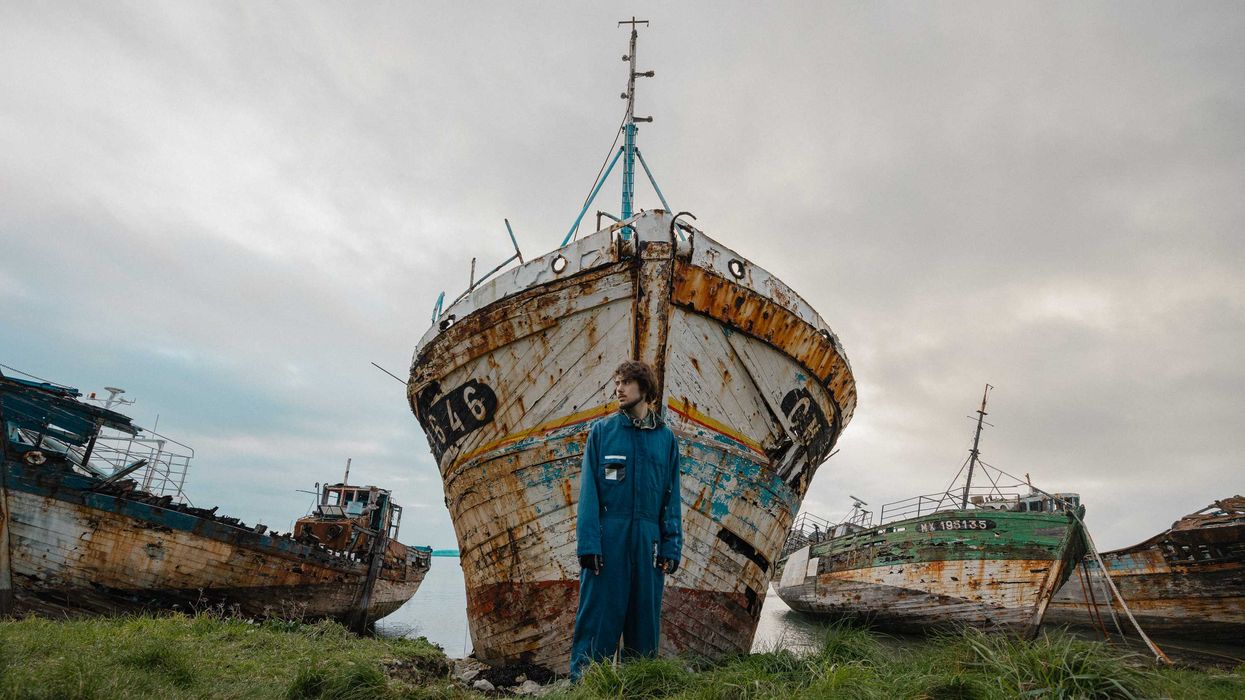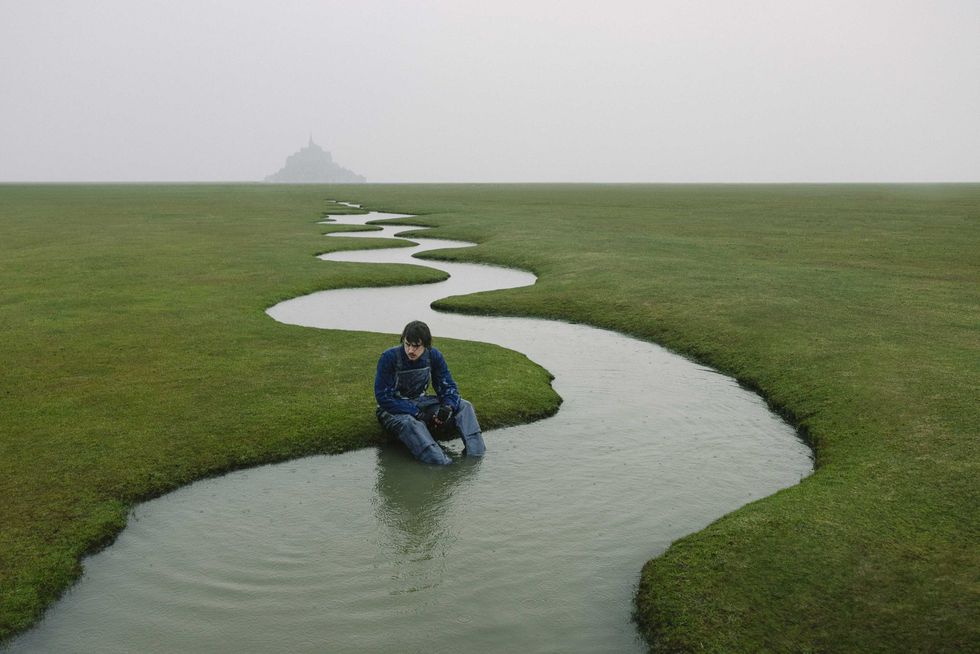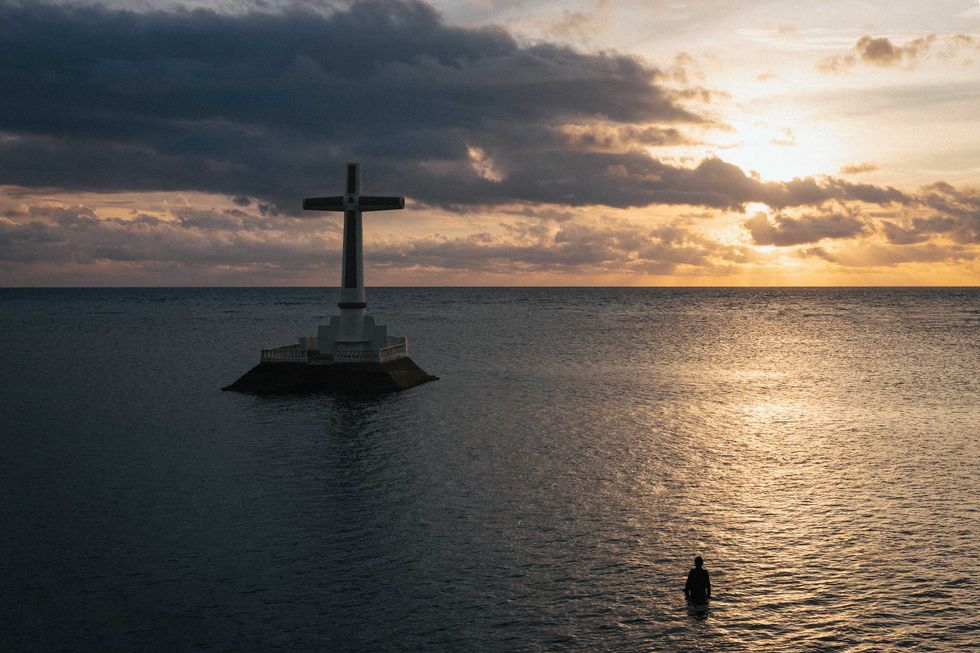Quadeca Leads His Choir

“I’ve been trying to defrost what’s true within me,” Quadeca tells me while nestled on a cozy grey couch in Irving Plaza’s greenroom. “One of the most powerful things about music is that vulnerability is a superpower. You can reclaim anything that is wrong. You can take a heartbreak and turn it into something that makes you feel euphoric. You can lean into scary thoughts and take control of them.”
It’s the afternoon before his sold-out show, and outside, the shouts from the ongoing No Kings Rally break through the venue’s warm interior. The world is large, rowdy, and filled with danger and monsters.
Quadeca knows all about monsters. He’s made it his mission — in the years since he pivoted from making viral soccer and music videos on YouTube to becoming a full-time musician — to making sense of a chaotic, heart-wrenching world through inspired projects of musical world building, namely two fantastical concept albums and one self-described, though still epic, mixtape/album, Scrapyard.
His latest album, Vanisher, Horizon Scraper, takes on the genre of an epic nautical voyage, and at one point, Danny Brown takes on the perspective of a mythical sea serpent, “THE GREAT BAKUNAWA.”
“A lot of music that I make is about disappearing or the small individual escaping everything,” he says. “The ocean is very interesting as an idea because it’s this thing that surrounds us. It’s this permanent force. It’s very musical. It’s very rhythmic and in a lot of ways, it mimics the way that life is: you think you have control over your destiny where you are moving, your sails, but ultimately, you’re at the whim of nature. It’s this idea of forging your path.”
Quadeca’s music mirrors his mission to seek control. His songs often contrast his voice — gravely, small and intimate — with expansive cinematic soundscapes, replete with strings, guitar, piano and the subtle presence of electronics. His songs feel like what happens when you give a kid raised on YouTube unending access to an orchestra.
It makes sense then that his fans would feel so connected to his work, given that he creates symphonic portraits of the quiet feelings of adolescence and young adulthood, like desolation, alienation, and an existential search for meaning. Whether it’s the uplifting anthemics of his Kevin Abstract-assisted Scrapyard-closer “TEXAS BLUE,” or the Bossa Nova-inflected croons of “GODSTAINED,” Quadeca’s music is vast and varied, but always harkens back to something base and simple: It’s easy to want to disappear. It’s tempting to hide.
His music and his concerts, though, can serve as a counter force to that impulse. It’s hard to feel invisible within Quadeca’s world.
“The shows are like a choir. [The fans] know all the words of every song. As a songwriter, I don’t always realize this, but a lot of songs I write are like choral chants,” he shares. “I perform with headphones on, but if I take them off, I can’t hear anything but all of the voices. It’s very surreal and really cool because part of me envisions these songs as group exercises.”
Hours later, I see this firsthand. As I stand above the riff raff in the Irving Plaza balcony, a crowd of young fans sing each word alongside Quadeca. They mosh and dance and wave as one great force. Like the ocean his new album evokes, the sea of bodies and swirl of voices becomes something huge and cresting.
I have seen a lot in my days as a music journalist, but rarely have I seen this dedication and unity.
PAPER chatted with Quadeca about building his lore, shifting from YouTube to musical world-building, and staying grounded as he faces a sea of reverent fans.

How has it been seeing all the people at your shows who have so clearly made your music a part of their lives?
The shows are like a choir. [The fans] know all the words of every song. As a songwriter, I don’t always realize this, but a lot of songs I write are like choral chants. I perform with headphones on, but if I take them off, I can’t hear anything but all of the voices. It’s very surreal and really cool because part of me envisions these songs as group exercises.
I’ve been meeting the fans and people will bring gifts to every show. There are at least five people with a tattoo that is in some way related to an album of mine. That’s kind of crazy. It’s hard to remain a person about it because the first couple of times [that happens], that’s the most insane thing ever, but then it’s also jarring when you see that happening at every show. If you expect people to have tattoos of you, something’s gone wrong. You have to remind yourself that everybody here has had their own individual parasocial connection to the music. Parasocial is a lot of times used derogatorily, but, if you connect with something personally, it’s an accurate [description]. I have to ground myself in the individuals as opposed to just, here’s everybody here to watch the show.
This newest record, Vanisher, Horizon Scraper, must be a very different experience to perform because of the scope of it, given its narrative and orchestration. Has performing these songs been a new experience for you as opposed to playing the last few records?
It’s fun to do musically because the chord progressions are interesting and I’m doing it with a band, so I get to rewrite the songs again [for the live show] and that’s always cool because I always stumble into three things per song where I’m like, Damn I like messed up writing the song, I should have had this guy do this guitar part. These songs fit the live setting nicely. The tour, though, is definitely an “Eras Tour” set because it’s heavy on the new record, but it’s got like
three to four songs from the previous ones too. I don’t have a recency bias with the discography. I just do the best songs.
I came to your music through Scrapyard. In an interview with Danny Brown, you talked about how that as record was a mixtape, which surprised me. It’s less of a concept album [compared to your other records], but it’s still ambitious on its own terms.
I probably just said that out of insecurity. I think about Scrapyard as an album. How you categorize music is like a preface — it’s an expectations game. At the time, it probably felt better to call it a mixtape because of what it represented, which is this interim [project] of songs that aren’t necessarily connected … but most of the time that’s just what an album is: songs that you think are good and aesthetically go together. That’s what the album is, so I think of it as an album. Maybe I felt like that because the album before it was so conceptual that, if that were the follow-up, people would view it as not a flop, but like, Oh, he didn’t go as ambitious, and thus it’s a step backwards. Everybody judges music based on the expectations created by the previous work. If I did I Didn’t Mean to Haunt You and then Vanisher, that would be lame as fuck because it’s like, Oh all this guy wants to do is concepts.
There aren’t that many people who are doing these big narrative concept albums in the way that you are. Did you always have a relationship to the concept album as a form?
I like concept albums because I like the idea that it’s an extra challenge. I love world-building, and I like the visual aspect of albums. There’s an opportunity for an arc if the album is a story. I like albums that feel all-encompassing. I like when I can have something that feels like it goes through a journey and then you end up somewhere. I don’t think that I have any opinion that concepts are better. They just suited the world-building and the stories around my ideas. Sometimes people are like, “Oh, it’s a concept,” as if that’s like an inherent marker of quality. That doesn’t matter at all.

What was the seed of the idea for the concept of this new record?
I was making music that felt very like a journey. A lot of music that I make is about disappearing or the small individual escaping everything. The ocean is very interesting as an idea because it’s this thing that surrounds us. It’s this permanent force. It’s very musical. It’s very rhythmic and in a lot of ways, it mimics the way that life is: you think you have control over your destiny, where you are moving your sails, but ultimately, you’re at the whim of nature. It’s this idea of forging your path. Doing that as an oceanic voyage is very existential and it’s in line with a lot of the themes that I naturally like to write about.
Did you grow up reading stuff about the ocean or longer fantasy narratives?
No. I never read a book.
What then were you listening to while you were making this record?
I was listening to a lot of old school Brazilian Bossa Nova. I was listening to a lot of MIA, because I think she’s hella underrated. Her first three albums are crazy. It’s the kind of music you listen to and you’re like, Hold on, what date did that say? How the fuck did you make that in 2005? A lot of people think of experimental hip hop and electronic music as [happening in] 2011 with Death Grips. MIA was doing shit that was more interesting in 2005. She’s combining electronic, aggressive, dancey rap music with all these drums from Southeast Asia and Africa. Her music is very aware of the world, but it’s bigger than whatever the scene is. I think that’s really cool. That was inspiring, because there’s always potential for more. People say shit is oversaturated all the time, but every now and then you listen to an album and you’re like, Damn, that was so long ago and nobody did it better. People are barely scratching the surface of the vastness of what you can do.
It’s interesting you talk about how MIA’s on her own frequency. I think of you as very similar. You have your peers, but I feel like you are doing your own thing. You’re not really tied to any one genre movement or micro-scene at all.
I agree and thank you for that, because a lot of times people will compare the people who [my] fans [also] like. If it’s a similar fan base, people go, These are the same kinds of artists. Most music discourse is founded upon assumptions based on fan bases, which is interesting, but I always just want to get people to listen.
You came from the world of YouTube. When I think of that realm that you were in, and I think of your music now, you seem like a sensitive, curious person. When I think of this guy, YouTube world, it’s like the opposite of that.
It’s just a different game. It’s just like a less true thing. It was like being a game show host. Even in my older things, there were still glimpses of that. I’ve just been trying to defrost what’s truer in in me. One of the most powerful things about music is that vulnerability is a superpower. You can reclaim anything that is wrong. You can take a heartbreak and turn it into something that makes you feel euphoric. You can lean into scary thoughts and take control of them. There’s a line you have to go over a few times and then once you realize you can go over that line and the world doesn’t collapse, you can just keep going.
Did it feel scary to initially leave that YouTube world?
It was bittersweet. It’s like leaving a school to go to another school. But it just needed to happen. I’m not going to be making a song with Dax in four years. It’s never going to happen. So it was a necessary step. With my career, I’ve gotten used to starting over every time. I was a kid in middle school making soccer videos. And then I was starting everything over by making everything about music. And then it shifted away from music-content to music in general. You have to chase what feels best, or your purpose and then hope that things work out around that. If you do some shit and feel like, Wow, that moved me. Then it will translate.
Photography by Ruben Plasencia